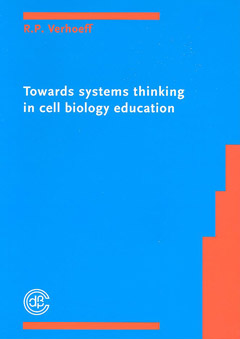 | Towards systems thinking in cell biology education FI Scientific Library, nr. 49. Verhoeff, R. P. (2003) 195 pp. |
 | https://www.fisme.science.uu.nl/publicaties/literatuur/2003_verhoeff_thesis.pdf Abstract Students are taught a large variety of life structures and processes at the cellular level. The concepts used to describe them are mainly drawn from the sub-cellular level, but this knowledge seems to be fragmentary if its integration at the cellular and organismic level remains undone. As a consequence, many students fail to acquire coherent conceptual understanding of the cell as a basic and functional unit of the organism. To enhance the coherence in students’ cell biological knowledge we introduce systems thinking as a key competence. A main characteristic of systems thinking is distinguishing and relating the various levels of biological organization, i.e. molecules, cells, organs, organisms and populations, in describing and explaining life phenomena. The aim of this study was to develop a theoretically founded and empirically tested learning and teaching (LT) strategy for cell biology in upper-secondary biology education based on systems theoretical notions. This aim was accomplished by means of a developmental research project. In the explorative phase of our research project, the general characteristics and structure of the (supposedly effective) teaching and learning process for cell biology from a systems theoretical perspective were identified. A significant part of the theoretical foundation of the study was articulated during this phase. This foundation includes the domain specific subject matter, i.e. its contents and conceptual structure, and reported solutions to learning problems within the domain. Studying relevant literature and testing some first theory-based ideas in the context of a classroom setting resulted in a problem diagnosis and inventory of solutions. The explorative phase resulted in the definition of design criteria for a preliminary LT-strategy that was tested in the cyclic research phase. In this phase two case studies at different schools were planned. |